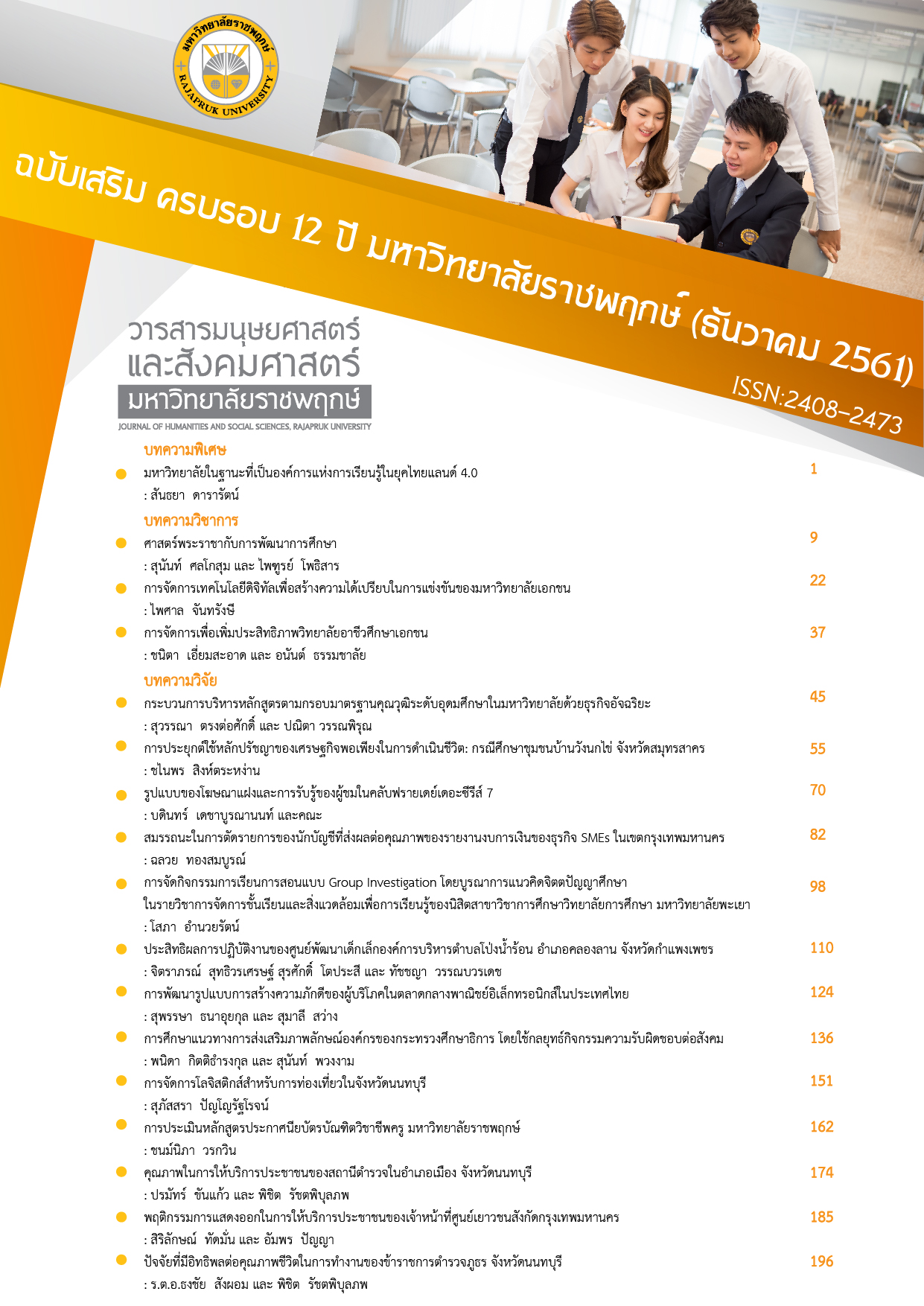The Curriculum Management Process Based on The Thai Qualifications Framework for Higher Education in University by Business Intelligence
Main Article Content
Abstract
The purposes of this research were; 1) to develop the curriculum management process based on the Thai qualifications framework for higher education in university by business intelligence, 2) to evaluate the curriculum management process based on the Thai qualifications framework for higher education in university by business intelligence. The research was divided into 2 phases: 1) to develop the curriculum management process based on the Thai qualifications framework for higher education in university by business intelligence, 2) to evaluate the curriculum management process based on the Thai qualifications framework for higher education in university by business intelligence. The sample of this research consisted of 7 experts who had experience not less than 3 years were selected by using purposive sampling method. Arithmetic mean and standard deviation were used in this research;
The research found that;
- Curriculum management process based on the Thai qualifications framework for higher education in university by business intelligence including 4 steps which were business intelligence planning, business intelligence operating, business intelligence checking and business intelligence activating.
- There are comments from the 7 experts who evaluated the appropriateness of the curriculum management process based on the Thai qualifications framework for higher education in university by business intelligence that the appropriateness of this process was high.
Article Details
References
ปรียาพร วงศ์อนุตรโรจน์. (2553). การบริหารงานวิชาการ. กรุงเทพฯ: พิมพ์ดี.
พินันทา ฉัตรวัฒนา และ ปณิตา วรรณพิรุณ. (2556). การพัฒนาแบบจำลองระบบเนื้อหาแบบปรับเหมาะสำหรับการเรียนแบบปรับเหมาะ เพื่อพัฒนาผู้เรียนที่มีความสามารถทางการเรียนแตกต่างกัน. วารสารวิชาการครุศาสตร์อุตสาหกรรม พระจอมเกล้าพระนครเหนือ, 4(1): 1 - 10.
วัชรี บูรณสิงห์. (2548). การบริหารหลักสูตร. กรุงเทพฯ: มหาวิทยาลัยรามคำแหง.
สำนักงานคณะกรรมการการอุดมศึกษา. (2558). ประกาศคณะกรรมการการอุดมศึกษา เรื่องแนวทางการปฏิบัติตามกรอบมาตรฐานคุณวุฒิระดับอุดมศึกษาแห่งชาติ (ฉบับที่ 3) พ.ศ. 2558.
สำนักงานปลัดกระทรวงศึกษาธิการ. (2559). แผนพัฒนาการศึกษาของกระทรวงศึกษาธิการ ฉบับที่ 12 (พ.ศ. 2560 - 2564).
Admir Schidic and Emina Junuz. (2016). International Journal of Education and Practice, 2016, 4(2): 71 - 83.
Buranasing, W. (2005). Curriculum management. Ramkhamhaeng University. (in Thai)
Chatwattana, P. and Wannapiroon, P. (2013). Development of Adaptive Content System model in Adaptive Learning for Developing Learners’ Different Learning Abilities. Technical Education Journal King Mongkut’s University of Technology North Bangkok, 4(1): 1 - 10 (in Thai)
Efraim Turban, Ramesh Sharda and Dursun Delen. (2014). Business intelligence and analytics: systems for decision. 10th ed. Pearson.
Gangadharan, G. R. and Swamy, N. S. (2004). Business intelligence systems: Design and implementation strategies. Proceeding of 26th International Conference on Information Technology Interfaces, Cavtat, Croatia.
Office of the Permanent Secretary Ministry of Education. (2016). Education Development Plan of the Ministry of Education volume 12 (2017-2021). (in Thai)
Office of the Higher Education. (2015). Announcement Board of Higher Education The Guidelines for Implementation of the National Higher Education Qualification Framework (No. 3) AD 2558. (in Thai)
Phumeechanya, N. and Wannapiroon, P. (2014). A Problem-based Ubiquitous Scaffold Learning System to Enhance Problem-solving Skills and Context Awareness. Technical Education Journal King Mongkut’s University of Technology North Bangkok. Vol 4. No. 1: 93 - 103. (in Thai)
Robert Stackowiak et al. (2007). Oracle data warehousing and business intelligencesolutions. Wiley.
Wonganutraroj, P. (2010). Academic administration. Bangkok: Pimdee. (in Thai)


